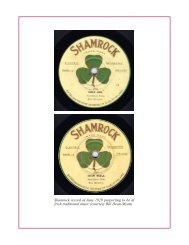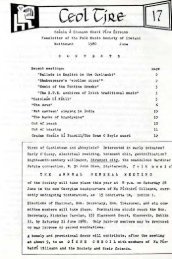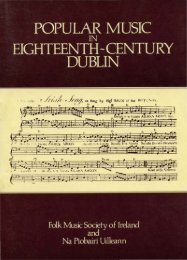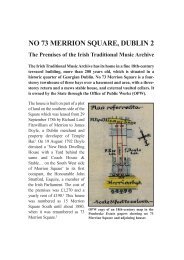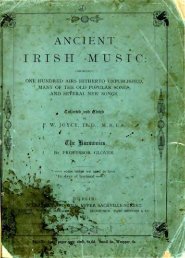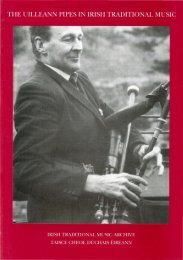Union Pipes - Irish Traditional Music Archive
Union Pipes - Irish Traditional Music Archive
Union Pipes - Irish Traditional Music Archive
You also want an ePaper? Increase the reach of your titles
YUMPU automatically turns print PDFs into web optimized ePapers that Google loves.
COURTNEY’S ‘UNION PIPES’ AND THE TERMINOLOGY OF IRISH BELLOWS-BLOWN BAGPIPES 10<br />
publications from the mid-1600s. But in the last fifteen years of the<br />
seventeenth century there ‘a liking for Scotch-style music became a<br />
positive craze’. 22 It was a craze that would last for over a hundred<br />
years. Chiefly this came about because of the innate attractiveness of<br />
Scottish (and faux-Scottish) melodies and songs to the English ear,<br />
and their exotic yet familiar character. But their acceptability must<br />
have been increased by the legislative union of England and<br />
Scotland which was brought into effect in 1707, and by the<br />
patronage of Scottish members of Parliament in London. Certainly<br />
there was a buying public in London for Scottish music throughout<br />
the century, and Scottish pieces featured prominently there in ballad<br />
operas and entr’acte performances. Many were published in London<br />
from the 1720s by the migrant Scottish music publishers William<br />
Thompson, James Oswald and Robert Bremner. Their popularity<br />
increased as Scottishness became less and less threatening in<br />
England after the defeat of the Stuart cause at Culloden in 1746, the<br />
subsequent absorption of Highland soldiers (and their military<br />
bagpipes) into the regular British army, and their emergence as<br />
British heroes in such engagements as the battle of Quebec in 1759.<br />
After the publication, beginning in 1760, of the poeticised<br />
‘translations’ into English by James MacPherson from the<br />
supposedly original Gaelic poems of Ossian, a Scottish bard of the<br />
third century, and their extraordinary Europe-wide success, positive<br />
ideas of Scottishness were further established in contemporary<br />
London consciousness. This was aided by the founding there in 1778<br />
of the Highland Society of London and by its high-profile<br />
aristocratic support for indigenous Scottish culture, including the<br />
publishing of ‘ancient Scotch music’ in the capital in 1784. 23<br />
22<br />
Fiske 1983: 5. See Fiske for a detailed discussion of Scottish music in<br />
eighteenth-century England.<br />
23<br />
A Collection of Highland Vocal Airs, Never Hitherto Published by Patrick<br />
MacDonald: advertised in The Morning Chronicle and London Advertiser,<br />
London, 11 Nov. 1784. The Society also encouraged the playing of the mouthblown<br />
Highland bagpipes by offering prizes at annual competitions, but these



